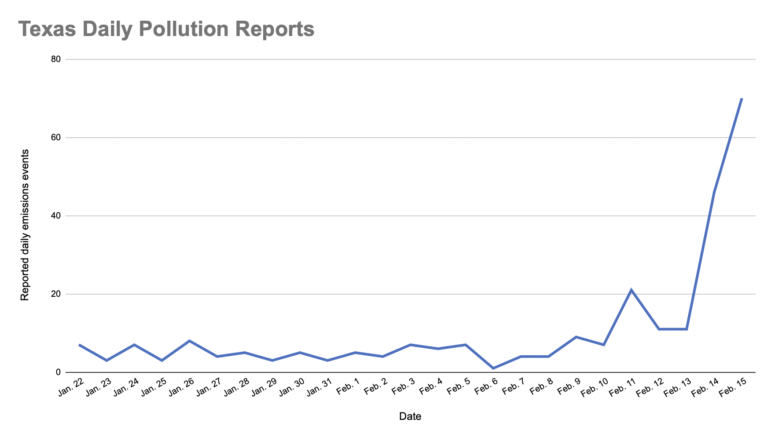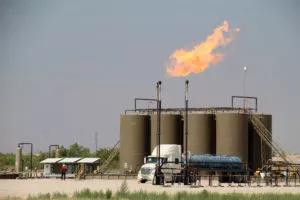As Texas begins to experience below-freezing temperatures one year after the state’s deadly blackout, the world is also bracing for another result of deep freezes no one seems to want to talk about: methane releases.
When temperature drops below freezing, parts of the oil and gas supply chain, like pipelines, freeze. The gas can’t get to power plants, and communities can lose power—4.3 million Texans lost power last year. That is not the only issue, however.
When equipment like pipes freeze there is nothing that causes oil and gas wells to stop working. Wells do not get the memo that there is a frozen pipe—they keep producing oil and gas that has suddenly nowhere to go. Anything upstream of pipelines, power plants and other facilities becomes over-pressurized. To reduce pressure, methane blasts into the atmosphere.
Methane is a greenhouse gas that is over 86 times more powerful than carbon dioxide at warming the planet. It is the main component of “natural gas” and it is released into the atmosphere throughout the entire oil and gas extraction and production process. Twenty-five percent of today’s warming is driven by methane. These operations also pollute the places where people live, work, learn, and play with toxic volatile organic compounds (VOCs) and other hazardous substances that can cause respiratory illness, headaches, cancer, and a range of other health problems.
While the local health impacts are significant, greater still are the devastating effects the disrupted climate brings upon human beings worldwide: increased cardiovascular, respiratory, and infectious disease; mental and physical effects from worsened extreme events like wildfires, floods, storms, heat and heat waves; food insecurity, drought, forced migration, and conflict.
In the weeks after the state’s cold weather snap last year, data showed refineries, pipelines, and other fossil fuel infrastructure were polluting at four times the rate that they were before the cold snap. Reported emissions events show a sharp uptick during the cold weather outbreak.

Despite the significant harm caused by methane pollution, Texas does not regulate methane emissions. Operators are required to self-report greenhouse gas emissions events other than methane – carbon monoxide, VOCs, sulfur dioxide, other contaminants – to the Texas Commission on Environmental Quality (TCEQ) to avoid fines for exceeding their pollution permits, but Texas’ limited oversight means those who do not self-report rarely get caught.
As operators continue to blast methane into the atmosphere without regulation, this pollution will continue to degrade the climate, and big weather events—such as freezes—will cause oil and gas equipment to back up and blast more methane into the air: a doom cycle.
It’s not just freezing temperatures that cause oil and gas companies to intentionally dump methane into our atmosphere. During extreme heat, for example, engines overheat and shut down. These engines serve many functions, such as compressing gas and pushing it down pipelines. When the engines shut down, the wells keep producing.
This is not just happening in Texas. It happens to some degree everywhere that oil and gas is produced.
The Intergovernmental Panel on Climate Change (IPCC) and the International Energy Agency (IEA) have made clear that rapid reductions in methane pollution from the oil and gas industry may be the easiest, lowest-cost, most impactful ways to address the climate crisis right now. But there is only so much methane rules can do, and even that will take an army of dedicated personnel to enforce—something Texas has proven is a nearly impossible task.
If we want to meet our climate goals, IEA recommends no new investments in oil and gas after 2021. We need to urgently stop all new permits and proceed with a rapid and just transition to renewable energy.
Methane is released from oil and gas equipment in many different ways. As long as we continue to allow oil and gas extraction and infrastructure to keep expanding, atmospheric methane levels will only climb higher—and along with them, the harmful impacts of the steadily warming climate.
Your Support Makes Our Work Possible
Earthworks helps families on the front lines of mining, drilling, and fracking. We use sound science to expose health, environmental, economic, social, and cultural impacts of mining and energy extraction. To support our efforts, please consider a tax-deductible donation today that will go toward our work reforming government policies, improving corporate practices, influencing investment decisions, and encouraging responsible materials sourcing and consumption.

